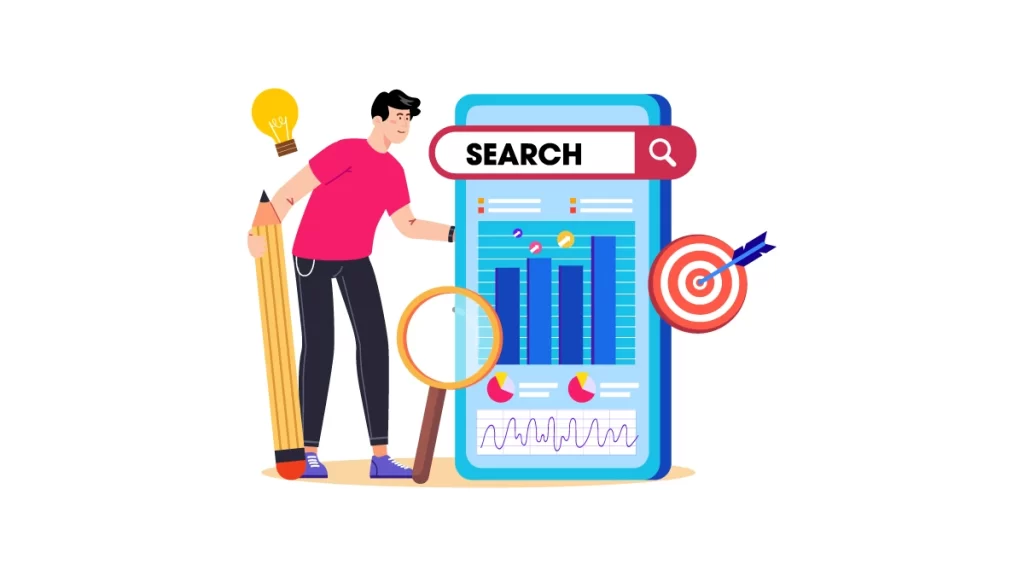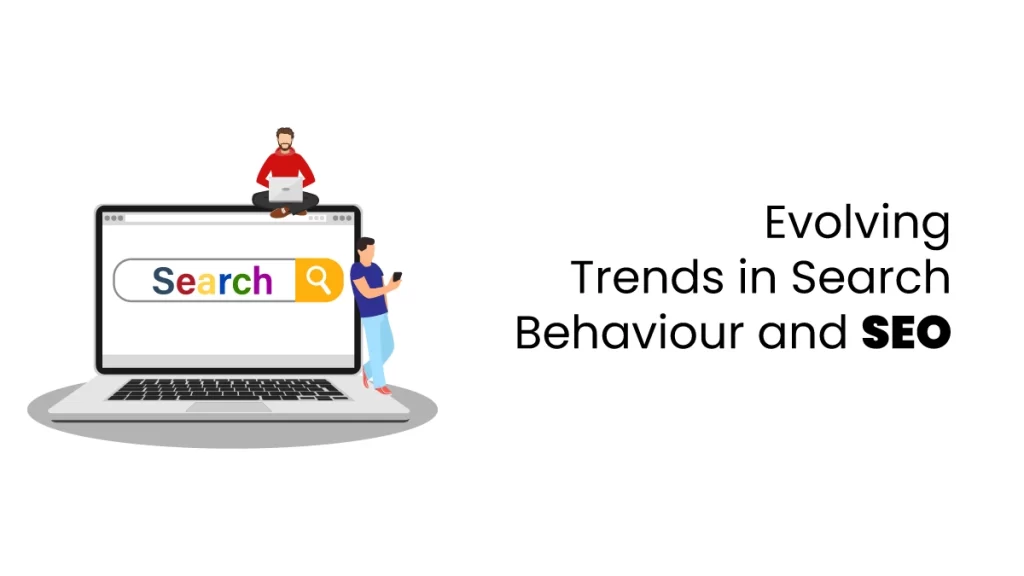Search behaviour has changed a lot over time. Earlier, search engines only matched words from a query. Now, with AI and natural language processing, they understand what people actually mean. The rise of smartphones also made voice search and image search popular, changing the way users look for information. Because of this, the role of SEO has evolved—it’s not just about keywords anymore, but also about creating quality content, website security, fast loading speed, and smooth navigation.
AI is making these changes even bigger. Tools like machine learning and generative AI help search engines give smarter and more interactive results, such as Google’s Search Generative Experience (SGE). For SEO experts, AI tools save time by fixing issues, improving site speed, and creating strategies that focus on the user. This makes AI a key part of the future of SEO.
Trends in Search Behaviour and SEO Strategies
Staying updated with changes in search behaviour and SEO Strategies is essential. The key to gaining audience trust is to provide relevant information and apply strategies that connect with their needs.
Matching Search Intent Is Essential
If you want your page to rank on Google, it must give people exactly what they are looking for.
- Example 1: If someone searches “how to bake a cake”, they want a recipe with clear steps — not just an article about cakes.
- Example 2: If someone searches “weather today”, they want today’s forecast — not a long explanation of climate.
When your page doesn’t meet the user’s needs, they leave quickly. Google notices this and may lower your page in search results. That’s why matching intent keeps your content relevant and your visitors engaged.
How to Optimise for Search Intent?
Every search has a purpose. To create the right content, you need to understand what the user wants.
- Tutorials & Guides → For people who want to learn step by step
- Quick Answers → For users searching for definitions or simple facts
- Tools & Calculators → For practical needs like conversions or estimates
- Lists & Comparisons → For shoppers comparing products or services
The easiest way to find search intent is to look at the first page of Google. The top results already show what users prefer. Once you know, create content that directly delivers the answer in a straightforward and user-friendly way.
SEO Shifts Toward User Behaviour and Experience
Think of Google as a judge watching how people react to your site. If visitors stay, explore, and enjoy your content, you score points. If they bounce away quickly, you lose ground in the rankings. Google pays close attention to these reactions because they show whether your page is truly helpful. A page that satisfies users will naturally rise higher. In short, happy visitors make Google happy too. This is a key consideration in understanding trends in search behaviour and SEO.
What Keeps Users Happy?
- Speed: Nobody waits for a slow site.
- Clarity: Quick answers beat long walls of text.
- Engagement: Videos, polls, or comment sections keep users involved.
- Smooth Navigation: A simple path keeps them exploring.
SEO today isn’t just about keywords—it’s about proving to Google that people love what you’ve built. The better the experience, the stronger the signal.
Decline in CTRs
- Google’s AI Overviews give answers directly on search.
- Other features like snippets, People Also Ask, and calculators add to zero-click searches.
- Result: fewer clicks to websites, though some sites may benefit if featured.
How to Adapt?
- Grow Presence – Be active on social media, YouTube, and forums so Google notices your brand.
- Target Click Keywords – Focus on terms with buyer intent, detailed guides, or tools that AI can’t replace.
Even if CTRs fall, people still need websites for more in-depth information, tools, and purchases.
Stronger Signals Beyond Backlinks
In the past, rankings were driven by the number of links you built. But in 2025, what matters more is how and where your brand is mentioned. When trusted sources or communities discuss your brand, it builds authority—even without direct links.
Ways to Strengthen Brand Authority
- Put forth information that people really want to share.
- Take part in conversations on social media and forums and add something worthwhile.
- Share studies or other resources that get people talking in your field.
Many positive mentions of your brand on the web show both Google and users that your brand is honest and trustworthy.
Rise of Visual Search
Many people are using photos to search instead of typing. Smartphones and improved image recognition make it easier for individuals, especially younger buyers, to click a picture or utilise an image instead of typing. A new survey even says that most Gen Z consumers like to seek things visually when they shop online. This change has already happened at big companies like Google, Amazon, Pinterest, and Instagram, so businesses need to adjust. Understanding these changes is essential for staying updated with the latest Trends in Search Behaviour and SEO.
To stay ready:
- Make sure your product photos are clear and detailed.
- Add descriptions so search engines understand your images.
- Use image-based features that match how people now search.
- Visual search is quickly shaping the way customers discover products, and adapting early can give brands a strong edge.
Customised Search Results
Search engines today don’t just show the same results to everyone. Instead, they adjust what you see based on things like:
- Where you are (your location)
- What time is it
- What you’ve searched or clicked before
This makes the search experience more personal and relevant.
For businesses, offering a personalised experience on your website is very important. It helps keep visitors engaged, lowers bounce rates, and increases sales.
How to do it:
- Create content that speaks to local users
- Make your pages interactive and engaging
- Do keyword research that matches different audience needs
- Keep monitoring performance and update regularly
When your site feels personal, users are more likely to stay, trust you, and convert into customers.
Digital Voice Search
Voice search is becoming increasingly popular because it’s quick and hands-free. Digital assistants often pull answers directly from featured snippets, so content should focus on natural, conversational language rather than short, exact keywords.
SEO Recommendations:
- Include long-tail, conversational phrases.
- Ensure your website is fully mobile-friendly
- Optimise for featured snippets and quick answers.
As voice search and intelligent assistants continue to evolve, regularly updating your SEO approach is essential to remain competitive.

Importance of UX in SEO
UX and SEO are now very closely related. A website should be easy for people to navigate and for search engines to read, which is essential to stay updated with the latest SEO trends.
- Make sure your website works well on mobile devices, since more than half of all web traffic comes from them.
- To improve both UX and SEO, focus on Core Web Vitals, which include loading speed, interactivity, and visual stability.
- A site that loads quickly, looks good, and works well keeps visitors and raises search engine ranks.
Creating Valuable, User-Focused Content
Content is the backbone of SEO — it includes blogs, videos, and interactive elements. The focus today is on solving user problems, not just adding keywords.
- Instead of focusing on particular keywords, find out what your audience is looking for and make content that is centred on those topics.
- Write long, helpful, and engaging content that makes you an expert in your field.
- Give honest answers; this keeps users happy and makes them want to share.
User Testing and Feedback Integration
User testing and feedback are still important for improving UX since they help find problems and suggest changes that are based on what real users need.
- Identifies usability issues that designers might overlook
- Provides actionable insights to enhance user satisfaction
- Supports SEO growth by creating a better overall user experience
Technical SEO Made Simple
Technical SEO ensures that search engines can crawl, understand, and index your pages efficiently.
- Make your website load faster and reduce loading times. Google says that bounce rates increase significantly if a page takes more than two seconds to load.
- Use sitemaps, link to other pages on your site, and provide good alt texts for photos.
- A site that is technically optimised not only makes it easier for users to navigate but also plays a crucial role in the future of SEO, helping your website rank higher over time.
Using AI and NLP to Improve SEO
Modern SEO relies on AI technologies to understand context and user intent rather than just matching keywords, reflecting the latest SEO trends.
- Natural Language Processing (NLP) helps search engines understand what people mean when they use synonyms, related words, and questions.
- Instead of stuffing keywords, pay attention to what users need, how they feel, and the situation.
- Using AI and machine learning lets your content remain ahead of search engines as they change.
Building Trust with E-E-A-T
E-E-A-T stands for Experience, Expertise, Authoritativeness, and Trustworthiness. It’s especially important for sensitive topics like health, finance, or legal content.
- Use author profiles to show off the skills and experience of content providers.
- Make yourself an authority by writing useful content that other people link to.
- Get good reviews and keep people’s trust by making browsing safe and easy.
- Sites that are safe and trustworthy are more likely to rank better and get users’ trust.
Conclusion
SEO is a dynamic and ever-changing field that keeps marketers on their toes. Leveraging the latest technologies can boost your SEO results, help analyse data effectively, and guide strategies that align with both audience needs and search engine algorithms. At Finprov, a leading Digital Marketing Institute in Calicut, students learn how to use AI tools for SEO while combining them with human creativity and expertise to produce meaningful, impactful results.
FAQs
Q1. What is SEO?
SEO helps your website show up higher on Google, so more people visit.
Q2. Why is user experience necessary?
If your site is easy to use, people tend to stay longer, and Google ranks it higher.
Q3. How does AI help SEO?
AI helps find the right keywords and improve content so people get what they want.
Q4. What are Core Web Vitals?
They measure how fast and smoothly your website works for visitors.
Q5. What is E-E-A-T?
It means showing your experience, knowledge, trust, and reliability to users and Google.










